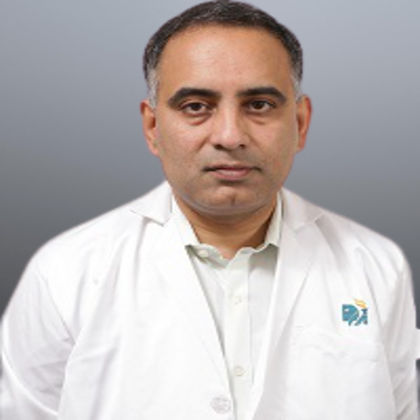Identifying the Symptoms of Adrenal Cancer: Key Signs and When to Seek Medical Advice
This article provides a comprehensive overview of the symptoms of adrenal cancer, helping individuals recognise potential warning signs and seek timely medical attention.

Written by Dr.Sonia Bhatt
Last updated on 3rd Jul, 2025

Adrenal cancer, also known as adrenocortical carcinoma, is a rare but aggressive form of cancer that originates in the adrenal glands. These glands are located on top of each kidney and are responsible for producing hormones that regulate various bodily functions, including metabolism, immune response, and stress response. Due to the adrenal glands' role in hormone production, adrenal cancer can cause a wide range of symptoms, some of which are related to hormone overproduction.
What is Adrenal Cancer?
The adrenal glands are responsible for producing hormones like cortisol, aldosterone, androgens and adrenaline, each of which plays an important role in regulating different bodily functions. When cancer develops in these glands, it can disrupt the balance of hormones, leading to a variety of symptoms.
Adrenal cancer typically starts in the adrenal cortex, the outer layer of the adrenal glands. There are two primary types of adrenal tumours:
Functional tumours: These tumours produce excess hormones, leading to hormone imbalances and a wide range of symptoms.
Non-functional tumours: These tumours do not produce hormones but can still cause physical symptoms due to their size and growth.
Understanding whether the tumour is functional or non-functional can help explain the wide variety of symptoms seen in patients with adrenal cancer.
Common Symptoms of Adrenal Cancer
The symptoms of adrenal cancer can be categorised into two groups: general symptoms related to tumour growth and specific symptoms caused by hormone imbalances. Below are the most common signs associated with each type.
General Symptoms of Adrenal Cancer
Abdominal Pain: A dull, persistent pain in the abdomen is one of the most common early signs. The pain may be localised near the adrenal glands or may radiate to the back as the tumour grows.
Back Pain: If the tumour grows large, it can put pressure on surrounding structures, leading to pain that radiates into the back.
Unexplained Weight Loss: As with many types of cancer, adrenal cancer can lead to unintentional weight loss. This may be accompanied by a decrease in appetite and a feeling of overall fatigue.
Fatigue: Extreme tiredness and weakness that does not improve with rest is another common symptom of adrenal cancer. This can be a result of the tumour itself or from the hormonal changes it causes.
Swelling or a Lump in the Abdomen: As the tumour grows, it may create visible swelling or a palpable lump in the abdomen. This is more likely in cases of non-functional adrenal tumours.
Hormonal Symptoms of Adrenal Cancer
Adrenal cancer can cause the adrenal glands to produce excess hormones, leading to a variety of hormonal symptoms. These symptoms can vary depending on the specific hormones being overproduced. Here are the key hormonal symptoms associated with adrenal cancer:
1. Cortisol Overproduction (Cushing Syndrome)
Cortisol is a hormone that helps the body respond to stress and regulate metabolism. When the adrenal glands produce too much cortisol, the result can be:
Weight Gain: Unexplained weight gain, particularly in the face (moon face), neck, and abdomen.
Muscle Weakness: Weakness in the muscles, especially in the legs.
Pink or Purple Stretch Marks: Stretch marks on the skin, particularly on the abdomen, thighs, and breasts.
Thinning Skin: Skin that bruises easily and heals slowly.
High Blood Sugar Levels: Increased blood sugar levels, potentially leading to diabetes.
High Blood Pressure: Elevated blood pressure levels.
Mood Changes: Depression, moodiness, and irritability.
Fat Deposits: Fat deposits behind the neck and shoulders (buffalo hump).
2. Aldosterone Overproduction (Conn's Syndrome)
Aldosterone helps regulate blood pressure and salt balance. Overproduction of aldosterone can result in:
High Blood Pressure: Elevated blood pressure levels due to increased sodium retention.
Low Potassium Levels: Low potassium levels in the blood, leading to muscle cramps, weakness, and fatigue.
Frequent Urination: Increased frequency of urination.
Increased Thirst: Feeling unusually thirsty.
3. Androgen Overproduction
Androgens are male hormones that are naturally present in both men and women. Overproduction of androgens by an adrenal tumour can cause:
Excessive Hair Growth: Excessive hair growth on the face and body (hirsutism), particularly in women.
Acne: Severe acne due to increased androgen levels.
Menstrual Irregularities: Irregular menstrual periods or absence of periods (amenorrhea) in women.
Deepening Voice: Deepening of the voice in women.
Early Puberty: Early onset of puberty in children, including breast development and menstrual periods in girls and enlarged penis or clitoris in boys.
4. Estrogen Overproduction
Although rare, adrenal tumours can produce excess estrogen. This can lead to:
Breast Enlargement in Men: Enlargement and tenderness of the breasts (gynecomastia) in men.
Reduced Libido: Decreased sex drive in men.
Erectile Dysfunction: Difficulty achieving or maintaining an erection in men.
Shrinking Testicles: Reduction in testicle size in men.
How Adrenal Cancer Symptoms Affect Daily Life
The symptoms of adrenal cancer can significantly affect your quality of life. If the tumour is functional and causing hormonal imbalances, the effects on your body can be dramatic, making it harder to manage routine tasks.
1. Physical Impact:
Pain and Discomfort: Persistent abdominal and back pain can make it difficult to perform daily activities, such as walking, sitting, or standing for extended periods.
Fatigue and Weakness: Generalized weakness and fatigue can reduce energy levels, making it challenging to complete routine tasks and maintain an active lifestyle.
Weight Changes: Unexplained weight gain or loss can impact overall health and self-esteem, leading to changes in diet and exercise routines.
2. Emotional and Psychological Impact:
Mood Changes: Hormone imbalances can lead to mood swings, depression, and irritability, affecting mental health and emotional well-being.
Anxiety and Stress: The uncertainty and fear associated with a cancer diagnosis can cause significant anxiety and stress, impacting daily life and overall quality of life.
3. Social Impact:
Reduced Social Interaction: Fatigue, pain, and emotional distress can lead to reduced social interaction and isolation, affecting relationships with family and friends.
Impact on Work and Daily Responsibilities: Symptoms such as fatigue, pain, and mood changes can affect the ability to work and fulfil daily responsibilities, leading to potential financial and occupational challenges.
Given the complexity of these symptoms, it’s crucial to work closely with your healthcare team to find effective symptom management strategies.
When to Seek Medical Help for Adrenal Cancer
Recognising when to seek medical help is crucial for early diagnosis and effective treatment of adrenal cancer. Here are some key indicators that you should consult a healthcare provider:
Persistent abdominal or back pain that does not go away
Unexplained weight loss or gain
Sudden changes in blood pressure or blood sugar levels
Unusual hair growth or menstrual changes in women
Symptoms of muscle weakness, fatigue, or easy bruising
A lump in the abdomen or noticeable swelling
Conclusion
Adrenal cancer is a rare but serious condition that can cause a wide range of symptoms, many of which are related to hormone overproduction. Recognising the symptoms of adrenal cancer is crucial for early diagnosis and treatment. If you experience persistent symptoms such as abdominal pain, back pain, unexplained weight gain, or hormone-related changes, it is important to consult a healthcare provider for proper evaluation and management. Early detection and treatment can improve the prognosis for individuals with adrenal cancer and help manage the symptoms effectively.
Consult Top Oncologist
Consult Top Oncologist

Dr. Tarun Jindal
Uro Oncologist
14 Years • MS (AIIMS, New Delhi), MCh (Gold Medalist), Fellow, VUI, Henry Ford Hospital, Detroit, USA; Robotic and Laparoscopic surgeon
Kolkata
Apollo Multispeciality Hospitals , Kolkata, Kolkata
(100+ Patients)

Dr. Sandeep Muzumder
Radiation Specialist Oncologist
21 Years • MBBS (JIPMER, Pondicherry), MD (AIIMS, New Delhi)
Bhubaneswar
Apollo Hospitals Old Sainik School Road, Bhubaneswar

Dr. Ganesh Chandra Subudhi
Medical Oncologist
16 Years • MBBS, MD- General Medicine. DrNB- Medical Oncology (DNSH, Delhi ). Consultant - Medical Oncology at Apollo Cancer Centre, Bhubaneshwar.
Bhubaneswar
Apollo Hospitals Old Sainik School Road, Bhubaneswar

Dr. Gopal Kumar
Head, Neck and Thyroid Cancer Surgeon
15 Years • MBBS, MS , FARHNS ( Seoul, South Korea ), FGOLF ( MSKCC, New York )
Delhi
Apollo Hospitals Indraprastha, Delhi
(25+ Patients)

Dr. Raja T
Oncologist
20 Years • MBBS; MD; DM
Chennai
Apollo Hospitals Greams Road, Chennai
(150+ Patients)